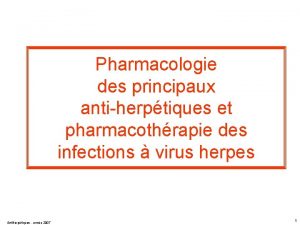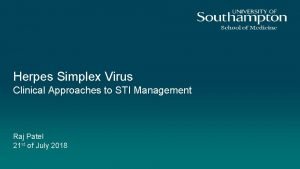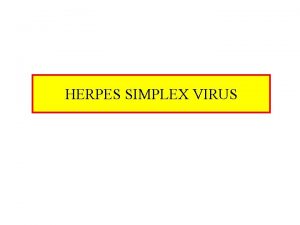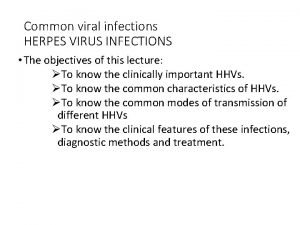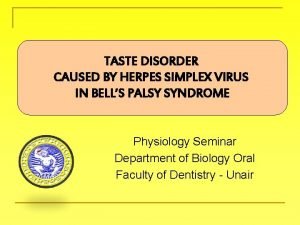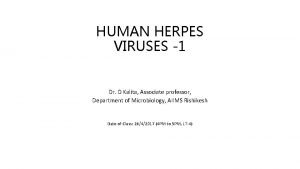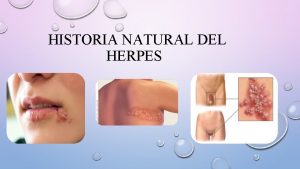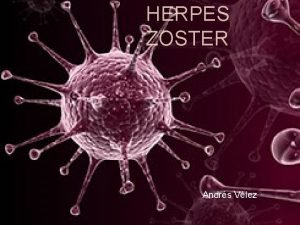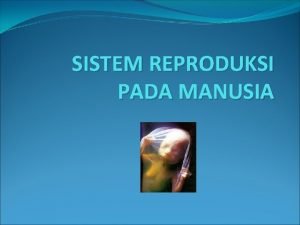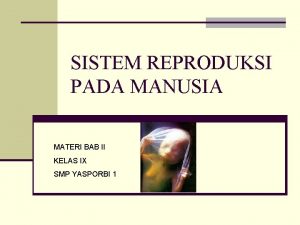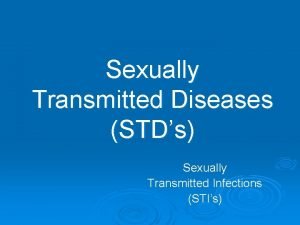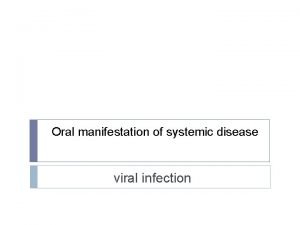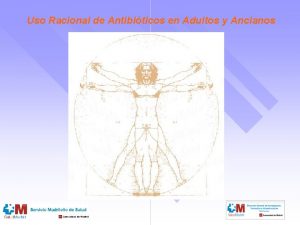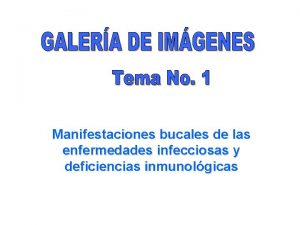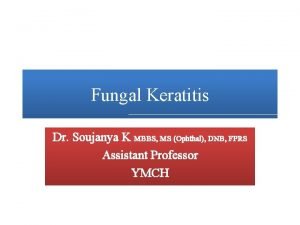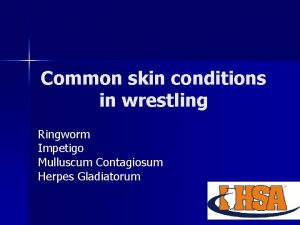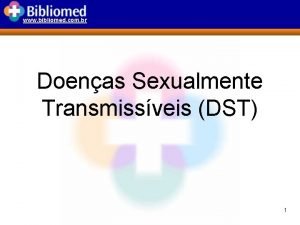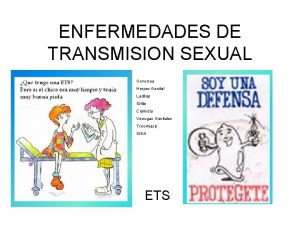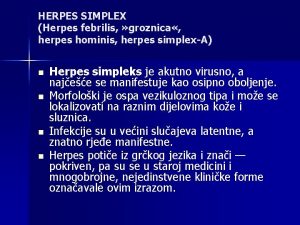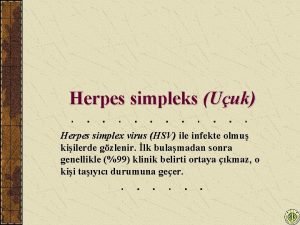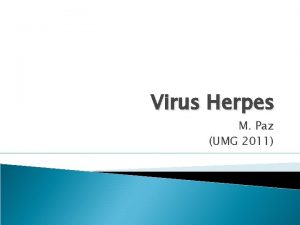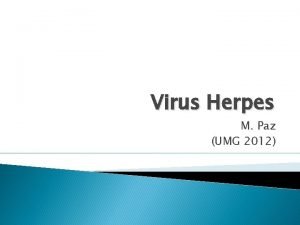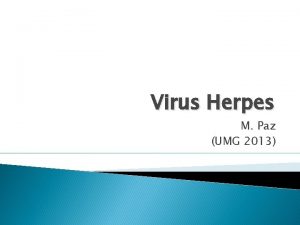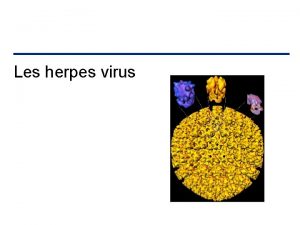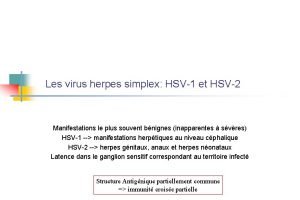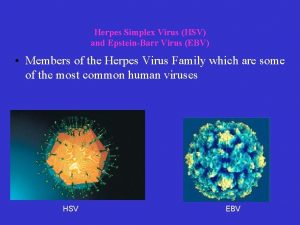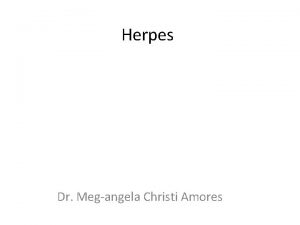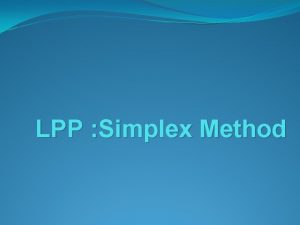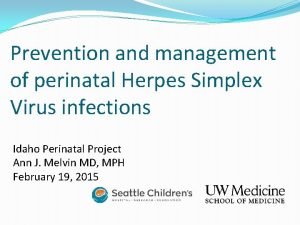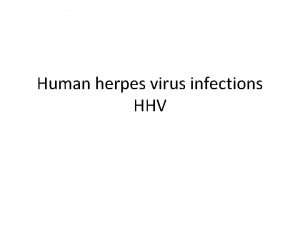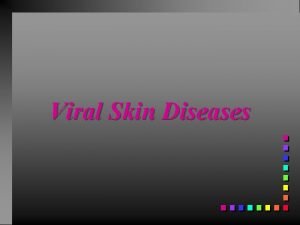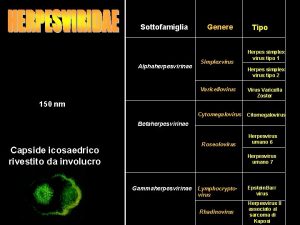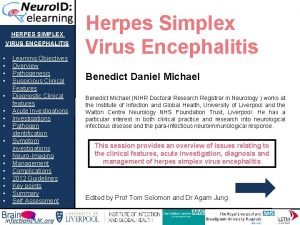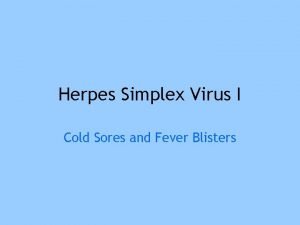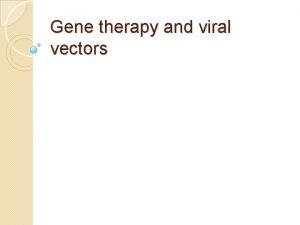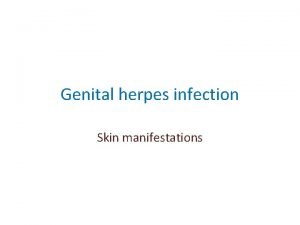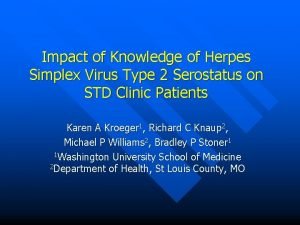Herpes Simplex Virus Clinical Approaches to STI Management
























- Slides: 24

Herpes Simplex Virus Clinical Approaches to STI Management Raj Patel 21 st of July 2018

Disclosures • Research grants: GSK, Novartis, Roche, CLJI, Beckton Dickenson • Speaker Panels/Advisory Boards : GSK, Novartis, Roche, BD, Genocea 2

Herpes Simplex Virus • Deadly synergy • Accounts for >30% of new HIV transmissions/acquisitions 3

Herpes Simplex Virus • Symptoms and signs • Variations in Natural History with HIV coinfection • Treatment Options • Complications, prognosis and clinical management in those with HIV co-infection 4

Clinical Genital Herpes Presentation 1 st Infection Latency No Reactivation Symptomatic 1 st Episode Clinically recurrent Disease Subclinical Disease

Viral Pathogenesis Virus Reactivated Virus Latent Virus Spinal Cord Primary Infection Illustration by FH Netter. © 2001 Icon Learning Systems. Recurrent Infection 6

Initial Infection • Only 25% of initial infections are symptomatic • Symptoms typically 4 -7 days after infection • Bilateral, erythema, papules, blisters- ulcers • Associated with local lymphadenopathy and some mild systemic symptoms • Symptoms peak at 11 days and subside usually by 3 weeks – clearance requires an intact, functioning immune system 7

Viral Pathogenesis Virus Reactivated Virus Latent Virus Spinal Cord Primary Infection Recurrent Infection Illustration by FH Netter. © 2001 Icon Learning Systems. 8

Clinical Genital Herpes Presentation 1 st Infection Latency No Reactivation Symptomatic 1 st Episode Clinically recurrent Disease Subclinical Disease


Recurrences • Majority atypical or asymptomatic • Short-lived/ occasionally warning (prodrome) • Rapid evolution from erythema to papule to blister-ulcer • Usually unilateral, less then 1 cm 2 • Short-lived and heal quickly without scaring / occasional systemic features • Genital recurrences can be frequent, severe and complicated • HSV-2 more frequent then HSV-1 in the genitals 11


HIV-HSV co-infection • HSV recurrence tends to be more frequent: 300% more shedding Ano-genital HSV-2 Reactivation Amongst HIV+ vs HIV- Men* • Multiple site involvement concurrently • Absence of effective cell mediated responses lead to persistence of active disease (large atypical lesions) Schacker et al, J Infect Dis 1998; 178: 1616 -1622 Similar patterns in pregnant women with much more frequent shedding

HSV - HIV Co-infection- clinically atypical Can be Large deep ulcers Persistent Risk of development of resistance- can establish latency

Treatment Options • Initial Infections • aciclovir 400 mg orally thrice daily for 10 days (standard dose) • aciclovir 200 mg orally five times daily for 10 days • valaciclovir 500 mg orally twice daily for 10 days • famciclovir 250 mg orally thrice daily for 10 days • • • Recurrent disease aciclovir 400 mg orally thrice daily for 5 days, 800 mg twice daily for 5 days, or 800 mg thrice daily for 2 days valaciclovir 500 mg orally twice daily for 3 days famciclovir 250 mg twice daily for 5 days • • Co-infection with HIV aciclovir 400 mg orally thrice daily for 5 days valaciclovir 500 mg orally twice daily for 5 days famciclovir 500 mg orally twice daily for 5 days 15

Recurrent genital HSV infection that are frequent, severe or cause distress • aciclovir 400 mg orally twice daily • valaciclovir 500 mg orally once daily • famciclovir 250 mg orally twice daily Dosages for people living with HIV : • aciclovir 400 mg orally twice daily • valaciclovir 500 mg orally twice daily • famciclovir 500 mg orally twice daily 16

Modifying therapy in HIV Co-infection • First line drugs all require viral thymidene kinase for activation • Some evidence that if the CD 4 count is restored after ARVs then standard doses of HSV antivirals can be used • Otherwise use medications at full / enhanced dose and avoid ultrashort therapies 17

Problems in Co-infection • Resistance • IRIS • Rare HSV complications • Pregnancy • Transmission 18

Problems in Co-infection - Resistance • HSV with replicate in the presence of antivirals and strains either partially or totally resistant to antivirals (usually with limited pathogenicity) will develop • Mutations in thymidase kinase and HSV viral DNA polymerase will confer resistance • HSV cleared by immune responses • These strains can became latent and will recur • Switching to alternative agents (Foscarnet, Cidofovir, Pritilavir, Imiquimod) will usually clear an infection • BUT recurrences will be resistant to 2 nd line agents- in the long term you need immune restoration 19

HSV - HIV Co-infection IRIS lesions • Recurrences can be persistent and last months to years • Persist despite CD 4 counts normalising • Topical immune modulators and cidofovir have been used • Excision and stitching of skin on the vulva and scrotum may be needed

Rare HSV related problems more common in the immune compromised • Disseminated HSV • Osephageal/ colon related ulceration • Encephalitis? • HSV keratitis? 21

Pregnancy HSV-HIV co-infection • Some studies show higher rates of HIV transmission and adverse pregnancy outcome with co-infection • Possibly only of historical significance in the age of advised universal ART in pregnancy • Tendency for earlier delivery in HIV positives suggests that any offer of HSV cover in late pregnancy should be made earlier (at 32 weeks aciclovir 400 mg three times a day to term) 22

HIV-HSV – Coinfection dynamics • Co-infection associated with higher HIV viral load and more rapid CD 4 declineof historical significance in the age of recommended early ART? • Co-infection associated with increased transmissibility of HIV from those not on ART- of limited significance with early ART and the Treatment as Prevention where these effects (higher risk of HIV transmission) are not seen • Note: HIV acquisition risk can not be modified in those with HSV using aciclovir or valaciclovir: Shedding of HSV can be reduced with aciclovir but short episodes of shedding (<6 hours) persist and HIV risks remain on therapy (with associated inflammatory marker presence) • ? new drugs? 23

Summary • HSV can be more troublesome in those with HIV • In advanced HIV a range of rare and severe complications of HSV can be seen • In the absence of effective ARVs for HIV, co-infection is associated with increased rates of HIV transmission and HIV progression • HSV related IRIS phenomena have been described • Resistant HSV can be extremely troublesome to manage and requires the underlying immune deficit to be improved 24
 Herpes simplex virus
Herpes simplex virus Faringite
Faringite Aciclovir varicela copii
Aciclovir varicela copii Hsv encephalitis
Hsv encephalitis Site:slidetodoc.com
Site:slidetodoc.com Simplex
Simplex Human herpesvirus 2
Human herpesvirus 2 Herpes gravid
Herpes gravid Vhs-1
Vhs-1 Herpes zoster clasificacion
Herpes zoster clasificacion Herpes simpleksserotipe 2
Herpes simpleksserotipe 2 Herpes simpleksserotipe 2
Herpes simpleksserotipe 2 Tempat berkembangnya janin
Tempat berkembangnya janin Google imagens
Google imagens Genial herpes
Genial herpes Herpes rugbiorum
Herpes rugbiorum Herpes zoster cicatriz
Herpes zoster cicatriz Goma sifilis
Goma sifilis Herpes la copii
Herpes la copii How to mix shingrix vaccine
How to mix shingrix vaccine Iridocyctitis
Iridocyctitis Mulluscum contagiosum
Mulluscum contagiosum Papilomavírus humano
Papilomavírus humano Valaciclovir dosis
Valaciclovir dosis Gonorrea
Gonorrea
